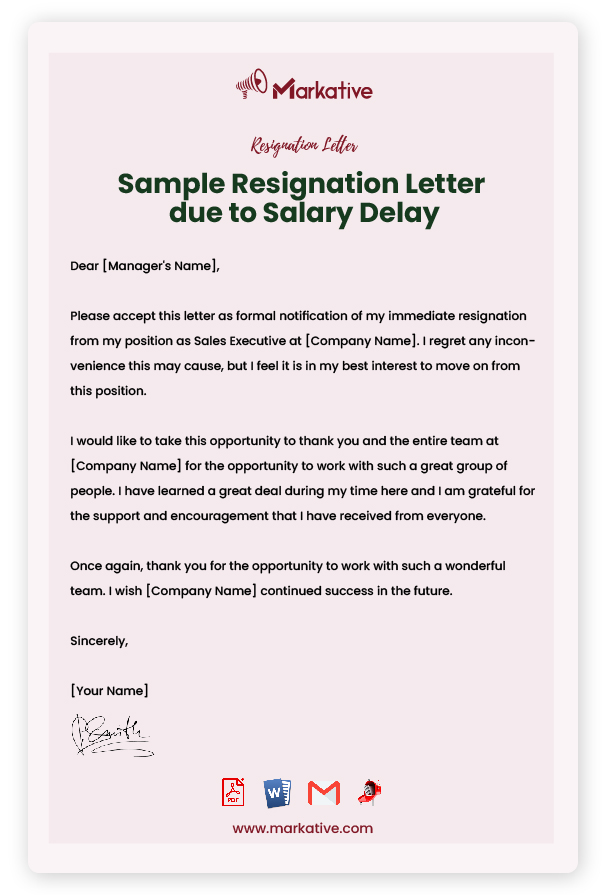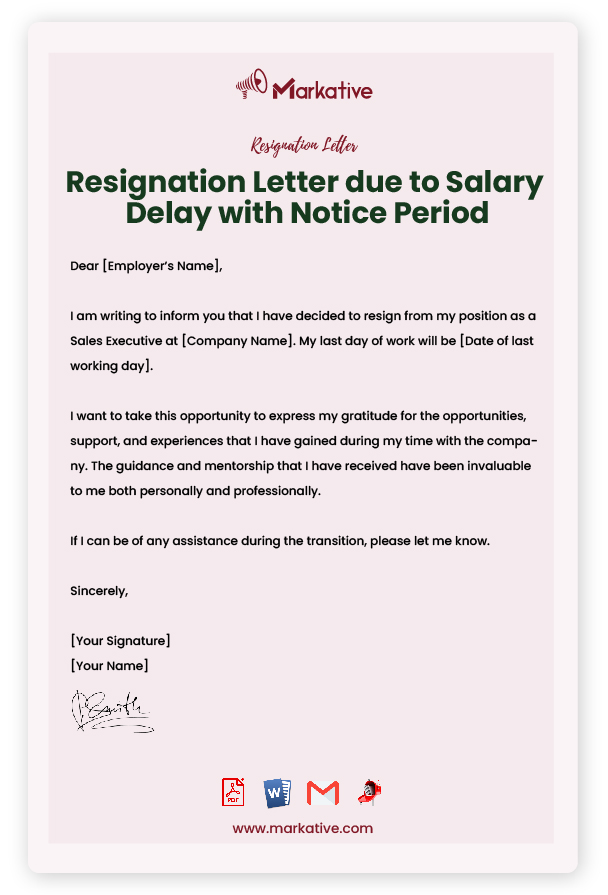Resignation is an important decision that employees make when they are no longer satisfied with their job or working conditions. One of the most common reasons for resigning is salary delay, which can create financial stress and frustration for employees. Writing a resignation letter due to salary delay is a crucial step in the process of leaving a job, as it not only formalizes the decision but also communicates the reasons for the resignation to the employer.
A good resignation letter can create a positive impact on the employer and the overall work environment. It shows professionalism, respect, and gratitude towards the company and colleagues. Additionally, it can help maintain a good relationship with the employer, which can be useful for future job opportunities. A well-written resignation letter can also create a sense of closure for both the employer and the employee, as it provides a clear and concise explanation for the decision to leave.
If you are considering resigning from your job due to salary delay, it is important to understand the importance of a good resignation letter. In this article, we will discuss why resignation is important, how a good resignation creates an impact, and provide tips on how to write a resignation letter due to salary delay. By the end of this article, you will have a better understanding of the resignation process and be equipped with the necessary tools to make a well-informed decision about your career.
How To Write Appealing Resignation Letter due to Salary Delay?
Writing a resignation letter due to salary delay can be a difficult task. However, with the right approach, you can write an appealing letter that clearly communicates your reasons for resigning while maintaining a professional tone.
Here are five steps to help you write an appealing resignation letter due to salary delay:
- Start with a polite and professional tone Begin by addressing your employer or supervisor respectfully and politely. State your intention to resign clearly and provide a brief explanation for your decision.
Example: Dear [Manager’s Name], I am writing to formally resign from my position as [Job Title] at [Company Name], effective [Date of Resignation]. I regret to inform you that I have made this difficult decision due to ongoing delays in receiving my salary.
- Provide specific details about the salary delay Be sure to include specific details about the salary delay in your resignation letter. This will help your employer understand the severity of the situation and the impact it has had on your decision to resign.
Example: Despite repeated requests for information and updates, I have not received my salary for the last two months. As a result, I have been struggling to meet my financial obligations, including paying my bills and supporting my family.
- Express gratitude for the opportunities and experiences gained It’s important to express gratitude for the opportunities and experiences gained during your time with the company. This will help to maintain a positive and professional relationship with your employer, even after you have resigned.
Example: I want to express my sincere gratitude for the opportunities and experiences I have gained during my time at [Company Name]. I have learned so much from my colleagues and managers and will always value the knowledge and skills I have gained while working here.
- Offer to assist with the transition process If possible, offer to assist with the transition process to help ensure a smooth handover of your responsibilities. This will demonstrate your commitment to the company and your willingness to help in any way you can.
Example: I am committed to ensuring a smooth transition process and am willing to help in any way I can to facilitate the transfer of my responsibilities to another team member. Please let me know if there is anything I can do to assist with this process.
- End with a positive and professional tone End your resignation letter with a positive and professional tone. Thank your employer for their understanding and support, and wish them and the company all the best for the future.
Example: Thank you for your understanding and support during this difficult time. I wish you and the team at [Company Name] all the best for the future and look forward to staying in touch.
Conclusion: Writing an appealing resignation letter due to salary delay is not an easy task, but following these five steps can help you to create a professional and effective letter. Remember to remain respectful and polite, provide specific details about the salary delay, express gratitude for the opportunities and experiences gained, offer to assist with the transition process, and end with a positive and professional tone.

Sample Resignation Letter due to Salary Delay
[Your Name] [Your Address] [City, State ZIP Code] [Your Email Address] [Today’s Date] [Recipient’s Name] [Recipient’s Job Title] [Company Name] [Address] [City, State ZIP Code] Dear [Recipient’s Name], I regret to inform you that I have decided to resign from my position as [Your Position] in [Company Name], effective immediately. As you are aware, there have been repeated delays in the payment of my salary, which has caused me significant financial strain and stress. Despite my repeated attempts to resolve this issue through various channels, the matter remains unresolved, and I have been forced to take this difficult decision. I value the opportunities and experiences I have gained during my time at [Company Name], and I will always be grateful for the knowledge and skills that I have acquired. However, the ongoing salary delays have made it difficult for me to continue working here, and I feel that it is in my best interest to resign and seek other employment opportunities. Please let me know the process for completing any outstanding work and returning company property. Thank you for your understanding in this matter. I hope that we can maintain a positive professional relationship in the future. Sincerely, [Your Name]
Resignation Letter due to Salary Delay with Notice Period
[Your Name] [Your Address] [City, State ZIP Code] [Your Email] [Date] [Employer’s Name] [Employer’s Address] [City, State ZIP Code] Dear [Employer’s Name], I am writing this letter to inform you of my resignation from the position of [Your Position] at [Company Name]. My resignation is effective as of [Date], which is the end of my notice period. The reason for my resignation is the delay in payment of my salary. As per the terms of my employment contract, I am supposed to receive my salary on the [Date] of every month. However, for the past [Number of Months] months, I have not received my salary on time, which has caused me financial difficulties. I have repeatedly raised this issue with the concerned authorities, but it has not been resolved. I have been left with no other option but to resign from my position. I want to thank you and the company for the opportunities provided to me during my tenure here. I have learned a lot and have enjoyed working with my colleagues. I will ensure a smooth transition of my responsibilities during my notice period. Please let me know how I can help during this time. Thank you for your understanding in this matter. Sincerely, [Your Name]
Resignation Letter due to Salary Delay without Notice Period
[Your Name] [Your Address] [City, State ZIP Code] [Your Email] [Today’s Date] [Employer's Name] [Company Name] [Address] [City, State ZIP Code] Dear [Employer's Name], I am writing to inform you that I am resigning from my position as [Your Position] effective immediately. This decision has been made due to the repeated delay in salary payments without prior notice, which has caused significant financial difficulties for me and my family. I would like to express my gratitude for the opportunities provided by the company during my tenure. However, the recent salary delays have caused me great distress and I have been left with no choice but to resign. Please note that I am unable to serve the notice period as per my contract due to the financial difficulties caused by the salary delay. I request you to kindly consider waiving off the notice period and releasing my pending salary and dues at the earliest. I will ensure a smooth handover of my responsibilities and will assist in the transition process to the best of my abilities. I hope you understand my situation and take the necessary steps to address the salary delay issue for the benefit of other employees. Thank you for your cooperation during my time here. Sincerely, [Your Name]
Resignation Letter due to Salary Delay with Reason
Dear [Employer's Name], I am writing to submit my resignation from my position as [Your Position] in [Company Name], effective [Date of Resignation]. This decision was not an easy one for me to make, but unfortunately, I have not been receiving my salary on time for the past few months. As you are aware, timely payment of salary is essential to meet personal and financial obligations. Despite multiple attempts to bring this issue to the attention of the concerned department, the situation has not improved. I understand that there might be reasons beyond the company's control for the delay in payment, but as an employee, it is difficult for me to manage my expenses without a regular income. I am grateful for the opportunities that [Company Name] has provided me during my time here, and I have learned a lot during my tenure. However, due to the current financial strain, I am left with no other option but to resign from my position. I would like to ensure a smooth transition for my replacement and am willing to work with my team to complete any pending assignments before my last day. Thank you for the support and understanding you have shown me during my time at [Company Name]. Sincerely, [Your Name]
Resignation Letter due to Salary Delay without Reason
[Your Name] [Your Address] [City, State ZIP Code] [Email Address] [Date] [Employer Name] [Employer Address] [City, State ZIP Code] Dear [Employer Name], I am writing to formally resign from my position as [Job Title] at [Company Name], effective [Date of Resignation]. I regret to inform you that I am compelled to resign due to the ongoing delay in receiving my salary without any clear explanation from the company. As you are aware, timely payment of salary is crucial for employees to meet their financial obligations and to continue working with dedication and commitment. Despite my repeated requests for an explanation for the delay in salary, no satisfactory response has been provided by the management. As a result, I have faced significant financial hardship which has impacted my personal and professional life. I have enjoyed working with [Company Name] and my colleagues during my time here, and I would like to express my gratitude for the opportunities and experiences I have gained while working for the company. I will ensure a smooth transition of my responsibilities and will complete any pending work before my last day. Please let me know if there are any specific requirements that I need to fulfill before my departure. Thank you for your understanding and cooperation in this matter. Sincerely, [Your Name]
How Much Notice Should You Give for a Resignation Letter due to Salary Delay?
According to a survey conducted by the American Payroll Association, 68% of employees in the United States live paycheck to paycheck. This means that a delay in salary can have a significant impact on an employee’s financial stability. In fact, 72% of employees say they would have difficulty covering their expenses if their paycheck was delayed by just one week. Furthermore, 43% of employees would consider leaving their job if their paycheck was consistently late.
When it comes to giving notice for a resignation due to salary delay, it’s important to consider your employment contract and any applicable laws or regulations. Generally, it’s recommended to give at least two weeks’ notice before resigning from a job. However, if your employer has consistently delayed your salary and you have exhausted all other options for resolving the issue, you may need to resign immediately. In this case, it’s important to communicate your reasons for resigning to your employer and provide any documentation or evidence to support your claims. It’s also a good idea to consult with a legal professional to ensure that your rights are protected.

Is it Ok To Email a Resignation Letter due to Salary Delay?
In some cases, it may be acceptable to email a resignation letter due to salary delay. However, it’s best to have a conversation with your employer first to see if there’s a way to resolve the issue before resigning. If you’ve already discussed the matter with your employer and they haven’t been able to provide a satisfactory resolution, then it’s reasonable to resign by email. Your email should be professional and concise, stating the reason for your resignation and expressing gratitude for the opportunities you’ve had at the company. For example:
Dear [Manager's Name], I regret to inform you that I have decided to resign from my position at [Company Name] due to a prolonged delay in salary payments. Despite our previous discussions, the issue has not been resolved, and I am no longer able to continue working under these conditions. I want to express my appreciation for the opportunities and experiences gained during my time here. Please let me know if there's anything I can do to ensure a smooth transition. Sincerely, [Your Name]
Common Mistakes When Writing a Resignation Letter due to Salary Delay?
- Not clearly stating the reason for resignation: When writing a resignation letter due to salary delay, it’s important to clearly state that the delay in salary is the reason for your resignation. Be concise and to the point, and avoid using overly emotional language.
- Being too aggressive: While it’s natural to feel frustrated or angry about not being paid on time, it’s important to avoid being too aggressive in your resignation letter. Use a professional and polite tone, and avoid making any threats or ultimatums.
- Not giving proper notice: Even if you’re resigning due to salary delay, it’s important to give your employer proper notice. Check your contract or company policy to see how much notice you’re required to give, and include this information in your resignation letter.
Conclusion:
resigning from a job due to salary delay can be a challenging decision, but it is important to communicate your reasons professionally and clearly through a resignation letter. This letter should be sent directly to your supervisor or HR representative, and should include your gratitude for the opportunity and any constructive feedback you may have. It is important to avoid common mistakes such as being overly negative or emotional in the letter, as this can harm your professional reputation.
To make the process easier, we have provided several free and ready-to-use resignation letter templates that you can use as a guide. By following these tips and using our templates, you can resign with grace and professionalism while still protecting your own interests.







